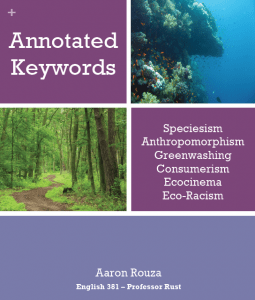Stephen Rust often tells his students in cinema studies courses that learning to carefully describe and analyze cinematic texts requires us to learn a new set of vocabulary terms and the ability to apply those terms. As students take a further step toward engaging in more specific discourse communities such as Ecomedia Studies it becomes even more important to gain an awareness and understanding of the sometimes complex terminology scholars use to think with as we seek to communicate with each other precisely and concisely.
The annotated keywords assignment Steve designed this past year for a course he taught at the University of Oregon on the topic of Ecocinema represents an attempt to engage students in both linguistic and audiovisual learning. The assignments requires students to identify keywords used by scholars in the field, to provide a concise definition of these terms, and to take the next crucial step in the learning process by deploying these terms to analyze audiovisual examples of their own choice. In this way students are able to both understand more fully the arguments and ideas of professional scholars and extend this understanding beyond the text.
 When students signed up for his course it was under the general title English 381: Film, Media, and Culture; so the vast majority of students had no idea that Steve would be tailoring the course to focus on Ecocinema. The course fulfills a general university arts and letters requirement so it draws students from the sophomore through senior levels from across campus. The examples provide a representative sample of the final products the students turned in for evaluation. It is useful to keep in mind that of the five students whose work is represented, two are cinema studies majors, one is a psychology major, one an economics major, and one a sociology major. These students approached the course from diverse ethnic and gender perspectives as well. Given this diversity, Steve was particularly impressed at the outcome of these projects and the class as a whole. This project, which was due during the fourth week of the term, marked a real turning point in the course as students became better able to navigate the arguments made in the textbooks he chose (Ecocinema Theory and Practice and Transnational Ecocinema), more adept at applying the ideas of scholars to the films screened in class, and more engaged in class discussions.
When students signed up for his course it was under the general title English 381: Film, Media, and Culture; so the vast majority of students had no idea that Steve would be tailoring the course to focus on Ecocinema. The course fulfills a general university arts and letters requirement so it draws students from the sophomore through senior levels from across campus. The examples provide a representative sample of the final products the students turned in for evaluation. It is useful to keep in mind that of the five students whose work is represented, two are cinema studies majors, one is a psychology major, one an economics major, and one a sociology major. These students approached the course from diverse ethnic and gender perspectives as well. Given this diversity, Steve was particularly impressed at the outcome of these projects and the class as a whole. This project, which was due during the fourth week of the term, marked a real turning point in the course as students became better able to navigate the arguments made in the textbooks he chose (Ecocinema Theory and Practice and Transnational Ecocinema), more adept at applying the ideas of scholars to the films screened in class, and more engaged in class discussions.
Stephen Rust teaches in the Department of English at the University of Oregon. If you are interested in a copy of the complete assignment, guidelines, or wish to provide Steve with feedback/suggestions on ways to improve the assignment, feel free to contact him.
